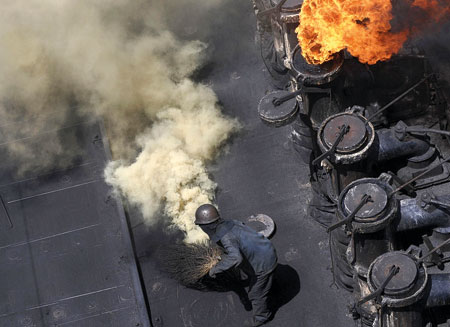The big two emitters try to stop finger-pointing and save the planet

THOUSANDS of officials from all over the world this week neared the end of two weeks of difficult talks in Bonn under the United Nations’ climate convention. But they were conscious that even more difficult and probably more important negotiations were under way in Beijing. America’s most senior climate-change officials were meeting their Chinese counterparts. The two countries are by far the world’s biggest emitters of greenhouse gases. They will determine whether a worthwhile global treaty to limit emissions can be concluded as planned in Copenhagen in December.
The treaty is to replace the Kyoto protocol, which expires in 2012. Some 180 countries will take part in the negotiations, but many feel that, on this issue more than any other, China and America make up a “G2” that determines the global post-Kyoto agenda. Shortly before travelling to Beijing, America’s climate-change envoy, Todd Stern, said that, though China may not be the “alpha and omega” of the international process, it was close. His delegation included President Barack Obama’s science adviser, John Holdren, and David Sandalow, the assistant energy secretary.
Details of the talks were scanty. Mr Stern was able to call them “a step in the right direction on the road to Copenhagen”. But progress is painstaking. Zha Daojiong, an energy-security expert at Peking University, says that, although he himself disagrees, many Chinese still feel the world’s original big polluters should be the first to pay for cleaning things up. Others suspect American critics see the issue as yet another stick in a relentless campaign to bash China. As one American official acknowledges, climate change is emerging as the biggest issue in bilateral relations, supplanting trade and human rights.
For their part, American critics of China make much of the rapid growth in its energy consumption. Indeed, in 2007 China overtook America as the world’s leading carbon emitter, with an estimated 1.8 billion tonnes of fossil-fuel emissions. As it decides how America should curb its own emissions, Congress remains keenly aware that potentially painful and costly steps will mean little if China stays on anything approaching its current trajectory.
China asserts its simple right to develop rapidly and make progress towards attaining Western living standards. It also points out that its consumption and emission levels per head remain a mere fraction of America’s. Moreover, a large chunk of its emissions come from producing goods consumed by rich developed nations, which have exported much of their manufacturing industry to China.
Lastly, China points to its impressive improvements in energy efficiency and coal-plant cleanliness in recent years, and its increasingly ambitious commitments to invest in renewable energy sources. According to Deborah Seligsohn, based in Beijing for the World Resources Institute, an American think-tank, China has received too little credit for the steps it has already taken and its commitment to do more. Others argue that China’s leaders have decided both that the Obama administration is serious about climate change, and that China, especially in its drought-prone north, will be a big loser from global warming. On this analysis, they may adopt even more ambitious energy-efficiency targets, if not emissions limits.
Mr Zha urges America to refrain from browbeating China into accepting distant targets for future reductions. That, he said, would be a narrow and empty victory, since it is too late for vague visionary principles. What is needed instead, he argues, is a workable timetable under which America agrees to rethink restrictions on sophisticated exports to China, and Beijing reduces tariffs to encourage the import of cutting-edge green technology.
In this context, another development in Sino-American relations strikes a discordant note. Sichuan Tengzhong, a private Chinese company, is to buy the division of General Motors, a beleaguered American carmaker, that makes the Hummer, a gas-guzzling hulk. There could be few clearer illustrations of the shifting contours of the quarrel between rich and poor countries over who is more to blame for climate change and who should do more to arrest it. Looking more like a tank than a car, the Hummer for years seemed to embody the worst excesses of American consumerism. Now, unless Chinese regulators reject the deal, as they may, it will become another symbol of China’s commercial clout and polluting potential.
